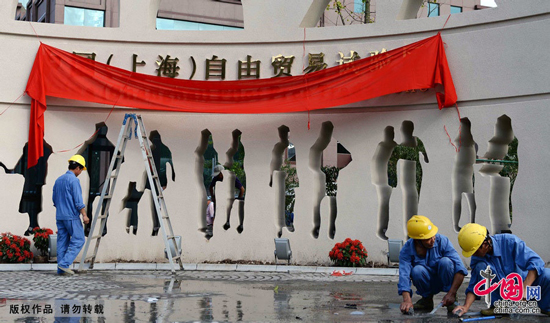Anticipating Shanghai FTZ
- By Zhang Lulu
 0 Comment(s)
0 Comment(s) Print
Print E-mail China.org.cn, September 25, 2013
E-mail China.org.cn, September 25, 2013
|
|
|
The much-anticipated China (Shanghai) Pilot Free Trade Zone will be officially launched on Sept.29. [Photo/ China.com.cn] |
The China (Shanghai) Pilot Free Trade Zone has received a lot of attention ever since it came into the spotlight at the end of last year. Some believe that it will be a testing ground, or a catalyst for China's financial reform or economic restructuring, while others believe that it will not cause as much change as is expected, due to its complexity and potential risks.
Though the detailed guidelines may not be released until the end of this year, according to a state television report, the FTZ is still eagerly anticipated as part of the project plan due next week.
Financial reform
Reform in the financial sector has been the highlight of the Shanghai FTZ, particularly the convertibility of the yuan and the liberalization of the exchange rate and interest rates, which will determine whether or not the yuan will be regarded as a global currency. Though China has already opened more than 30 of 40 capital account items recognized by the IMF, there is still considerable room for liberalization: the yuan is still not fully convertible, and exchange and interest rates are still managed and regulated by the central bank.
According to Professor Ding Zhijie, dean of the School of Banking and Finance at the University of International Business and Economics, the prices of financial products in China are not determined by the market, and the domestic market and foreign market are separated, which has led to arbitrage and speculation on rates. If the yuan became fully convertible and interest and exchange rates were liberalized, China would be able to make significant financial progress.
Regulation and deregulation
Financial reforms in the FTZ have sparked much debate. People are concerned that there are huge risks. Professor Li Lianfa of the Peking University's School of Economics has warned that since China's financial regulation lags behind the intended reform, government regulation is still needed, not only for financial institutions, but also for individuals who break the law or disrupts the market order. He cited as an example last month's Everbright Securities trading error. He suggests that tools, especially licences, could be used to channel investment in the Shanghai Free Trade Zone. Others, however, disagree. Professor Ding Zhijie of the University of International Business and Economics argues that worries about the potential risks at this moment will obstruct reform, while the core issue now is how to promote reform. He cites the "negative list" management approach as an example. The list, which outlines which sectors are restricted and which are free for entry, means that the government would work as a supervisory instead of an approval body, which should not be the case. He believes that this measure would draw a line between the government and the market, preventing the government from over-regulating and intervening in the economy, and prevent a real market economy from being established.
Leverage in the negotiation of new international trade rules
The Shanghai Free Trade Zone has also been perceived as an attempt to simplify increasingly complex negotiations in international trade agreements. For example, in the Trans - Pacific Partnership Agreement (TPP), more than 13 Pacific nations, including the U.S., Japan and South Korea, have collaborated to establish new trading rules. This may put pressure on China, especially as the U.S. tried to head the agreement, and China was not involved.
"The establishment of the Shanghai Free Trade Zone will help China to explore ways to integrate its trading policies with global trade liberalization, and also win leverage in negotiating and setting up the new international trade rules", Professor Ding Zhijie said.
Change is welcome
In summary, the Shanghai Free Trade Zone faces doubts and uncertainties. But as Premier Li Keqiang has said time and again, China's reform has entered "the deep end"; further reform and opening-up is imperative, and hence changes initiated by the Shanghai Free Trade Zone are definitely welcome -- be it a giant leap or gradual transformation.







Go to Forum >>0 Comment(s)